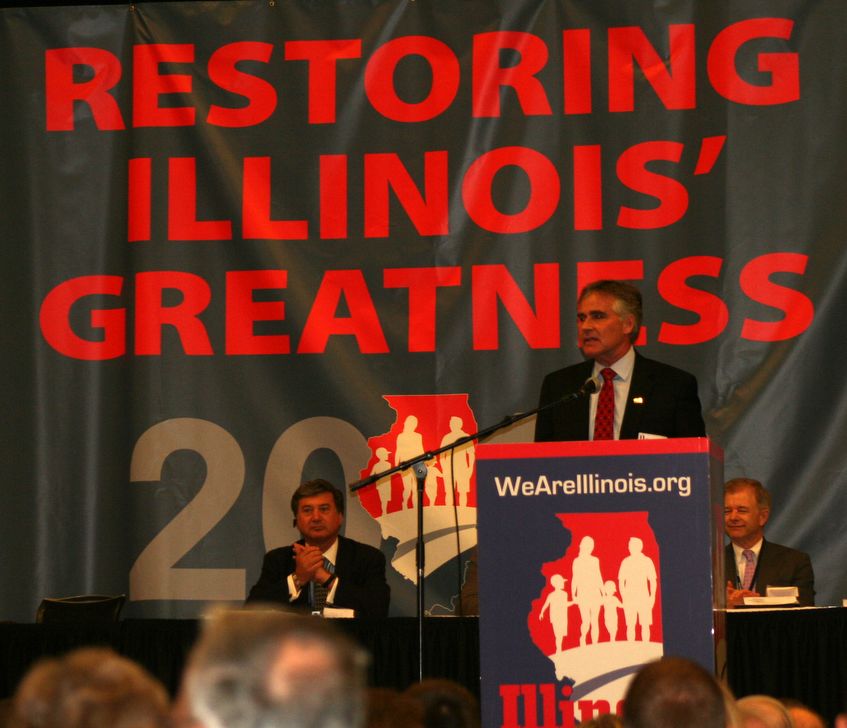Q&A with an Illinois Ron Paul Delegate: "Leadership dictates the party"

The following interview is with Illinois Ron Paul Delegate, Greg Bishop, who attended the Illinois Republican State Convention held in Tinley Park, Illinois on June 9th. Bishop recently explained his first hand experience of the incident where the Ron Paul delegation was shut out of the state convention.
AJ: Please provide for the readers your background?
Bishop: I'm an activist at heart. Having been on the air with a politically-driven radio talk show for nearly 6 years, my experience in reaching out to the community to get active has been rewarding. For the past 5 years, I have managed liberty minded groups to advance libertarian principles in the Republican Party and in central Illinois. I've also helped organize rallies to audit the Federal Reserve and brought candidates from across the political spectrum to stand in support of a non-interventionist foreign policy. I'm working towards finishing up my Masters in Communication which analyzes the Mainstream and Alternative media's coverage of the first month of the Occupy Wall Street movement.
You were at the Illinois Republican State Convention. Can you please describe your experience?
Bishop: My involvement with the Illinois Republican Party has primarily been to advance Ron Paul's position, and to support candidates that want limited government and a non-interventionist foreign policy. I've been working for the Paul campaign as a volunteer district and county organizer. My team of volunteers and people across the state have gathered tens-of-thousands of signatures to ensure Ron Paul's place on the ballot. After all of this hard work, going to the Illinois GOP State convention in 2008 was an interesting experience. We knew that we'd be newbies and learned a ton from the process, even though one of our initiatives was shutout of the convention. For the 2012 convention, the Ron Paul camp had more people, and more organization. We held conference calls in the weeks leading to the convention to work on platform issues we wanted to present to the various "open" committees. We felt good going into the convention. After the first few moments of the Platform committee, we quickly realized that it was an exclusive process. Even with all the delegates there, wanting to take part in the process of forming the platform and voting, we walked away feeling very disenfranchised.
From your perspective why do you feel that you, and the other Ron Paul delegates, were shut out at the State Convention?
Bishop: We're outsiders. We don't fall inline with what the Old Guard has in mind for the future of the Republican Party. They wish to keep their influence yet at the same time they welcome the new numbers. The fact is, this year's convention was the largest GOP convention in Illinois history. That's because of the Ron Paul supporters that decided to get involved. That involvement is in question now that some feel getting shut out of the convention was deliberate effort to keep the liberty message out of the Republican Party.
Did you and the other delegates have a preconceived notion that an action like this was going to happen at the State Convention?
Bishop: We did think that going into the convention this year, as opposed to four years ago, we had a better handle on things and were prepared. But, that preparation was for naught because the convention had a predetermined outcome. Was it naive to believe that a minority could go into a private party and change the platform? Yes. But we at least thought we could influence some members of the party. That didn't happen as there was very little chance for any kind of opposition to speak up.
What does this say about not only the state party leadership but how the process works?
Bishop: Leadership dictates the party. These are private parties. They don't have to follow the same rules that other governing bodies are guided by. The rules change last minute and are kept close to the vest. Opposition is "iced out" of providing any input. And the leadership has big sway with the various delegation heads. An example of this from the weekend convention is when the liberty group was trying to get a motion on the floor. We were tasked, by the rules of the party, to get a motion signed by the heads of 50 delegations. When we approached a meeting with the county chairman, we entered right at a moment when a man was telling the county leaders "Madigan tries to get democrats to be delegates, so don't sign anything." In other words, the leadership dictates to the lower ranks what to do and very few lower ranks diverge from that prescribed path. It's very troubling that only 41 of the more than 110 delegation heads signed our petition. It wasn't a petition for approval of the motion, it was simply a petition to get the motion on the floor for a vote. County leaders must have been worried that they'd piss off a state leader if their name was on that petition.
What lessons can be learned from this?
Bishop: It's hard to say what the lesson is from this, because we've already known that the Old Guard is steadfast in keeping their position and their power. Interestingly, as we were driving up to the convention, we had heard the news that Ron Paul's son Rand had endorsed Mitt Romney--a huge sin in the eyes of most all Ron Paul supporters. The politics of the endorsement makes sense, but the compromise of principle does not. That had most of us asking the question "Now what?" Do we keep working with the GOP establishment to build our ranks in an already established party, eventually having the numbers to change the platform and allow for more openness and inclusion of other ideas? Or do we drop our involvement and instead work to advance other movements? Or both? I don't know the answer.




